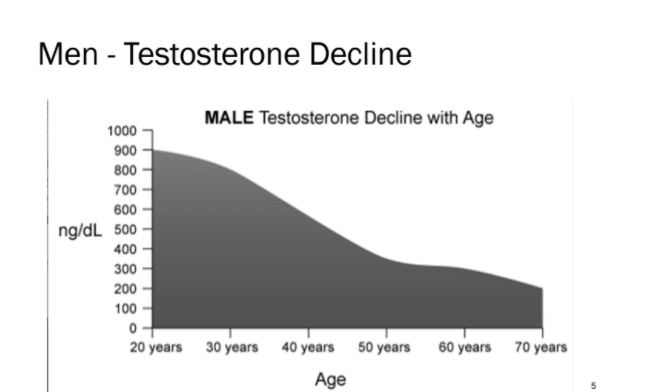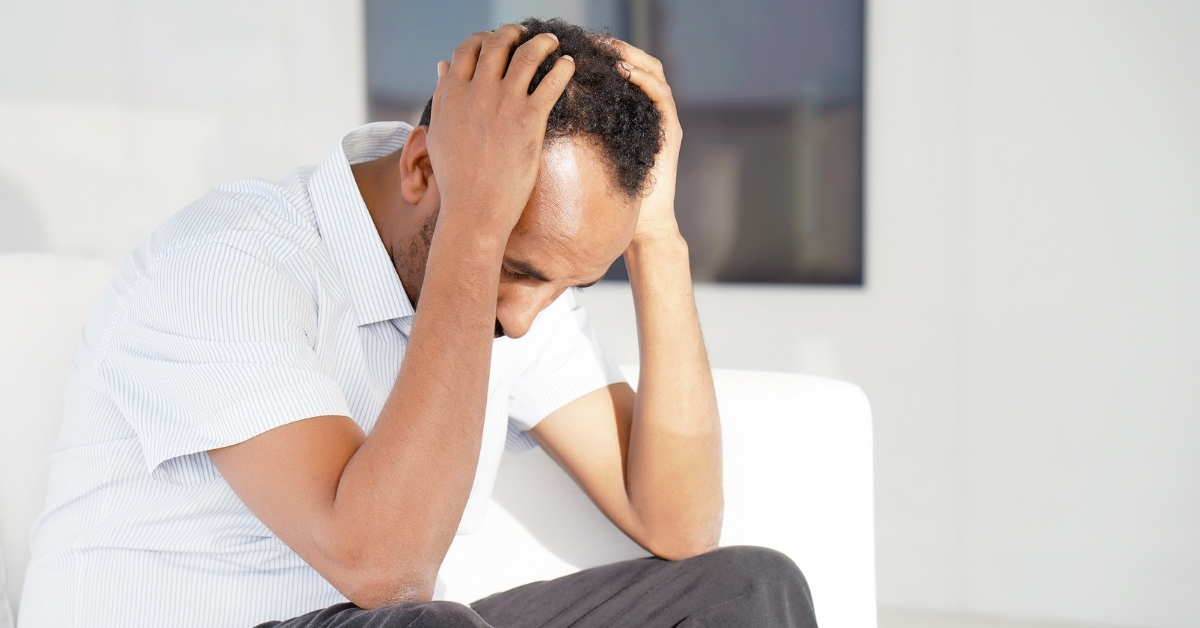The term male menopause, also called andropause, can be a little misleading. It might seem that a sudden drop in testosterone occurs in middle-aged men, similar to what happens in female menopause. This is, however, not the case.
While female menopause happens due to a dramatic reproductive hormone plunge, sex hormone changes in men occur gradually.
Dr. Kenneth Kee indicates that male menopause affects 52% of men between 40 and 70 in the U.S. and that 25 million men in the U.S. are experiencing male menopause.
The gradual decline of testosterone levels in men is either called late-onset hypogonadism, age-related low testosterone, or androgen deficiency of the aging male (ADAM). Male menopause is the drop in testosterone production in men who are 50 years or older.

How Do Testosterone Levels Change Over Time?
Testosterone is a hormone produced by the testes and is responsible for the development of masculine characteristics, such as:
- Increased muscle mass and strength
- Growth of body hair
- Deepening of the voice
- The enlargement of the penis and testes
- Growth in height
- Fat distribution
- Sex drive
- Sperm production
Testosterone is responsible for maintaining sex drive, production of sperm cells, male hair patterns, muscle mass, and bone mass in adult males.
Dr. Kenneth Kee also states that testosterone improves the oxygen uptake of cells throughout the body and helps control blood sugar, regulates cholesterol levels, and helps maintain the body’s immune surveillance.
Puberty
Before puberty, testosterone levels in males are low. During puberty, the presence of testosterone influences the above changes.
Adulthood
According to the Mayo Clinic, most men reach peak testosterone levels in adolescence or early adulthood. As men age, testosterone production in their bodies naturally declines, as mentioned above, by about 1 percent per year.
Some males may experience systems of early on-set andropause as early as 35. Total male testosterone levels can drop by almost 40% by age 40 and 50% by age 50.
What Causes Andropause?
The most common causes detailed for male menopause are as follows:
- Age-related lowering of blood testosterone.
- Injury to the testes.
- Surgical removal of the testes due to cancer.
- Certain auto-immune diseases.
- Genetic abnormalities causing premature testicular failure.
- Diabetes.
- Infections of the testes such as mumps.
- Heavy smoking reduces blood flow to the testes.
- Chemotherapy.
- Pituitary tumors.
What Are the Symptoms of Andropause?
As with female menopause, there are several symptoms associated with andropause. According to an article in the International Journal of Clinical Practice, the main symptoms of hypogonadism, where the testes produce few or no hormones, are:
- Decreased libido.
- Erectile Disfunction.
- Reduced muscle mass and strength.
- Osteoporosis or low bone mass.
- Depression.
- Fatigue.
Some of the other, less common, symptoms men might experience are:
- Insomnia or poor sleep patterns.
- Increased body fat.
- Breast enlargement or Gynecomastia.
- Cognitive impairment such as memory loss and poor concentration.
- Decreased motivation.
- A general lack of enthusiasm or energy.
- Decreased self-confidence.
- Irritability and mood swings.
- Hot flushes or sweats.
- Infertility.
- Reduced body hair.
The Indian Journal of Endocrinology and Metabolism mentions that the rate of decline in testosterone levels can be affected by chronic diseases such as obesity, illness, serious emotional stress, and medications.
How is Andropause Diagnosed and Treated?
If you experience several of the above symptoms, you should speak to your doctor. Your doctor may order blood tests to test your testosterone levels. They may also perform a physical exam, ask about symptoms, and order tests to rule out other medical problems that could be contributing to your condition.
You could probably manage your symptoms without treatment unless they are causing you serious hardship and are a disruption in your life. The biggest stumbling block in receiving treatment for male menopause is that many men are too shy or intimated to go to their doctor and discuss sexual topics.
Andropause can be difficult to diagnose as the symptoms are very vague and may vary among individuals. Many symptoms are also associated with other medical conditions, such as depression, and middle-aged men might believe that their health problems are just part and parcel of the aging process.
Dr. Kee indicates that the situation is changing. He writes that researchers have found that depression might be caused by an imbalance in hormones such as testosterone, amongst others.
There is an ongoing research on andropause to devise effective diagnostic blood tests and to interpret them better.
Treatments
Some of the symptoms of male menopause can be treated by making healthier lifestyle choices such as:
- Adopting a healthy diet.
- Getting regular exercise and staying active.
- Getting enough sleep.
- Managing Stress.
- Treating Anxiety.
- Reducing alcohol intake.
Depression can be treated with prescription antidepressants, therapy, and lifestyle changes.
Testosterone Replacement Therapy (TRT)
Another treatment option is male hormone replacement therapy (HRT), also referred to as testosterone replacement therapy (TRT). In this case, your doctor would refer you to an endocrinologist who specializes in hormone problems. You can also begin testosterone therapy by consulting with a licensed telemedicine provider. HRT telemedicine providers like EVOLVE help make your journey to living an optimal lifestyle hassle-free. Our team of qualified experts can schedule your physician consultation and male hormone panel test today. Blood lab tests will be completed in person, and your results will then be reviewed by an EVOLVE physician who creates your personalized treatment plan.
Testosterone replacement therapy can be delivered in different methods, namely, pills, injections, patches, gels, or implants. The therapy can improve signs and symptoms of low testosterone in men. According to the Mayo Clinic, testosterone therapy can help reverse the effects of hypogonadism, but there is no clear evidence that it would benefit older men who are otherwise healthy.
The Winchester Hospital found that testosterone replacement therapy improved the symptoms of sufferers treated for low testosterone levels. Patients found that TRT:
- increased their sex drive.
- restored erectile function.
- improved their mood.
- increased their bone density.
- increased their muscle mass.
- maintained beard growth.
Side Effects of TRT
Before considering testosterone replacement therapy, one should consider the following risks associated with the therapy:
- Worsening of sleep apnea.
- Acne or other skin reactions.
- Stimulating non-cancerous growth of the prostate and increasing existing prostate cancer.
- Enlarged breasts.
- Decreased sperm production.
- Shrinkage of the testicles.
- An increased risk of forming blood clots due to over-stimulation of red blood cell production.
Other side effects of testosterone that have been reported are headaches, weight gain, increased aggression, and male-pattern baldness.
Conclusion & Getting Started with Treatment
If you believe that you are suffering from andropause and feel that you require treatment, it is best to speak to your physician about the risks and benefits of testosterone therapy. EVOLVE is a leading hormone replacement therapy provider and can help you get started with treatment. Ready to get your testosterone levels optimized? Schedule a call with Patient Care @EVOLVE!
References:
Indian Journal of Endocrinology and Metabolism – https://www.ncbi.nlm.nih.gov/pmc/articles/PMC4046605/
International Journal of Clinical Practice – https://www.ncbi.nlm.nih.gov/pmc/articles/PMC2948422/
Mayo Clinic – https://www.mayoclinic.org/healthy-lifestyle/sexual-health/in-depth/testosterone-therapy/art-20045728
Winchester Hospital – https://www.winchesterhospital.org/health-library/article?id=45937
Dr. Kenneth Kee’s book – “Andropause (Male Menopause) A Simple Guide to The Condition, Diagnosis and Treatment”: https://books.apple.com/ca/book/andropause-male-menopause-simple-guide-to-condition/id1002212368







